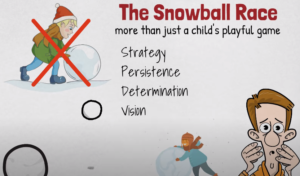Introduction
74% of millionaires believe millionaires inherited their money. That makes sense because saving a million dollars with a $50,000 salary is not easy. It’s going to take you a lifetime. Even $100,000 is not enough. You have to pay rent, take care of your kids, and put food on the table.
However, it’s not a subjective question. All we have to do is take a look at the data. Around 80% of millionaires are self-made, and only a small minority of them (20%) have inherited their wealth. In fact, just 16% of them inherited more than $100,000. That’s nowhere close to the amount that could make you financially free. Only 3% of millionaires inherited more than a million dollars. In other words, 97% of people have put their blood and sweat into being where they are.
It’s great when your parents can help you financially, but it’s not enough just to pass you some cash. At the end of the day, if you don’t know how to manage that money, you are destined to go broke. One way or another, we have seen countless examples where people didn’t just inherit millions of dollars but rather billions of dollars, and they managed to go broke. You can’t blame them because they are teaching you what they think is the best.
When I talk to people, it seems like I am not the only one who gets so much bad financial advice. Here in this article, I want to share with you seven dumb money advices my parents gave me, and yours probably as well. The only spoiler I give you is that number five is one of the worst ones since this alone is probably the major cause of 99% of people being submerged by debt.
1. Good grades mean more money.

Good grades mean more money. When I was a kid, you have no idea how much my parents emphasized my grades. Every conversation I had with my parents was somehow related to my grades. I have been a terrible student since the day I stepped foot in school. I don’t know why, but I really hated school with my entire being.
But when you hate the school, the school hates you back. You know those teachers who, when they see a kid doing poorly in class, instead of helping him to do better, pressure him to fail? I mean, your job as a teacher is to help kids improve, not worsen their lives. Maybe that’s why so many kids hate school.
And here is my favorite part: for some reason, you are expected to know everything when you come to school. I am coming to school to learn. If I knew all of these things, why would I come to school in the first place? I tried to argue with my parents that school is an absolute waste of time, but my parents kept telling me how getting good grades would secure me a good future.
The truth is that no one cares about my or your grades. The world doesn’t give a damn about your A’s or C’s, not my employer when I got my first job, not my customers when I started my first business, nor my real estate clients when I got into real estate. Neither are you, because my grades are irrelevant. All that matters is how interesting or helpful this article is. That’s the only reason you’re going to read this article, not because I got good or bad grades back in school.
2. Don’t Waste Your Time With Friends Parties

Don’t waste your time with your friends or at parties. It doesn’t really matter how much you know. You can have the entire Wikipedia in your head, but it’s not going to help you if you don’t know how to use that knowledge.
Take this channel, for example. This channel wouldn’t be possible if there wasn’t a team behind it. Your iPhone, MacBook, or Amazon Prime wouldn’t exist if it weren’t for collective work. So if you want to build something meaningful, you have to learn how to socialize with people. And the best way to use your social skills is to spend time with other humans by going to parties, events, or simply going out with friends.
Some parents try to isolate their kids as much as possible so they grow far away from other people, filled with insecurities and lacking confidence. Going to parties or spending time with friends is a crucial component in forming your character and skills to be able to either build a successful business or a solid career.
3. Play it safe.

Play it safe.You are the most precious thing they have. They are the reason you are in this world, and they have spent years of their lives feeding you and taking care of you until you grow up.
That’s why parents usually tell you to play it safe, don’t take unnecessary risks, get into college, then get a job, move slowly through the ranks, and by the time you’re 60, you will be successful by traditional standards. Where you finally pay back your mortgage, and if you’re lucky, you will be left with some savings.
However, that’s not how you make money in this world. There is a simple rule in business: the more risk you take, the more money you could possibly make. The less risk you take, the smaller the reward. If you invest your money in government bonds, for example, which are super safe, the maximum that you can hope for is 2%, which is lower than inflation.
But if you take a slightly higher risk and invest it in the stock market, you can expect to get 10%. But if you want to go extreme and invest in crypto, you might be able to double your money in a matter of a few months. This is, of course, not financial advice, but the point is that you can’t make real money by playing it safe.You should find common ground where you both understand what you’re doing, and there is an element of risk.
4. You get what you deserve.
You get what you deserve. The text emphasizes that life is not always fair, and individuals may not necessarily receive what they believe they deserve. It challenges the notion that a lengthy tenure in a company guarantees recognition and highlights the competitive nature of the business world.
Life’s Unfair Realities: The text suggests that the idea of getting what one deserves is more of an exception than a rule. It encourages individuals to actively seek acknowledgment and rewards, drawing parallels between business and warfare to illustrate the cutthroat nature of the corporate landscape.
Business as Modern Warfare: The text portrays business as a form of modern warfare, where strategic maneuvers are necessary for success. It asserts that success requires more than just effort; it demands a strategic and assertive approach to withstand the inherently unfair competition.
5. Do Better Than Your Peers

Do better than your peers. This section explores the potential pitfalls of comparing oneself to peers, especially in the context of financial well-being. It challenges the advice to “do better than your peers” and critiques the mindset of measuring success solely by societal standards.
The Perils of Comparison: The text criticizes parental advice that encourages comparing oneself to others, particularly in terms of academic and financial achievements. It warns against a mindset that measures success solely by societal standards, which can potentially lead to financial stress and unnecessary competition.
Forge Your Own Path: Encouraging individuality, the text dismisses the idea of keeping up with peers. Instead, it urges individuals to identify their unique strengths and weaknesses, paving the way for more authentic and personally fulfilling success.
6. Prioritize job security over your passion.
Prioritize job security over your passion. This section challenges the conventional wisdom of prioritizing job security over pursuing one’s passion. It acknowledges the importance of a stable income but asserts that personal fulfillment and happiness should not be sacrificed.
Balancing Stability and Passion: The text encourages individuals to take calculated risks in pursuing their passions, suggesting that real success and happiness can be achieved by following one’s dreams, even if it deviates from the conventional path.
Don’t Fear the Unconventional: Challenging the fear associated with unconventional paths, the text advocates breaking free from the traditional mindset. It encourages individuals not to fear taking a less conventional route and to embrace the potential rewards that come with pursuing one’s passion.
7. Follow in our footsteps.

Follow in our footsteps. This section critiques the advice to blindly follow in the footsteps of predecessors, emphasizing the need to adapt to changing times and embrace new opportunities. It warns against rigidly adhering to past practices and encourages individuals to forge their own unique paths.
The Pitfalls of Blind Adherence: The text identifies the potential limitations of blindly following family traditions and past practices. It suggests that such adherence can hinder growth and limit opportunities in a world that is constantly evolving.
Embrace Change and Exploration: Encouraging adaptability, the text urges individuals to embrace change and explore new avenues. It emphasizes that innovation and growth often stem from breaking away from the familiar and venturing into uncharted territory.








